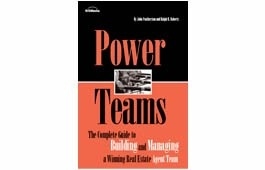
Excerpt series provides insight into recently released book
RISMEDIA, June 2, 2008-Agents are often too busy doing business to create a business. As a result, they end up working 80 hours a week for most of their adult lives and then retire without a business entity they can sell or pass on to their kids. The reason this happens is because agents often fail to take the time to plan their work and then work their plan. By drawing up a business plan for your team, you can begin to build a business entity that lives on and continues to generate income for you long after you stop selling homes
In Chapter 4 of RISMedia’s recently released book, “Power Teams: The Complete Guide to Building and Managing a Winning Real Estate Agent Team,” by RISMedia President & CEO John Featherston and top-producing Broker Ralph R. Roberts, we cover the basics of drawing up a business plan for your team, complete with a mission statement and organizational chart. Following is an excerpt from Chapter 4:
The Components of a Solid Business Plan
The first step in transforming a loose collection of team members into a bona fide business entity is to draw up a business plan. A business plan is an essential tool in formulating a vision for your team, setting goals, and developing a strategy for moving from point A to point B. It sends a clear message to you, other team members, and anyone outside the team, that your business is bigger than any one individual. In addition, if you need a business loan, your plan shows banks that you have put some thought into your business and have a strategy in place for turning a profit.
Your business plan doesn’t have to be intricately detailed, but it does require a substantial amount of thought and foresight. It needs to address the structure of your business, where your team wants to go, how it’s going to get there, and what it’s going to do once it is there. A business plan establishes early on that what you are creating is an entity unto itself-something that is bigger than the sum of its parts-in this case, the individual team members.
Familiarize yourself with the key areas that your business plan must address in order to be effective:
Describing your business
Defining your market
Analyzing current issues and existing resources
Communicating your vision
Projecting revenue
Budgeting for expenses
Identifying sources of investment capital
Note: A business plan can range from a few pages to 30 or 40, depending on the complexities of your business model and the size of your business. What’s important is that you have a detailed plan in place. As you begin to implement your plan, it is likely to change and will usually grow.










